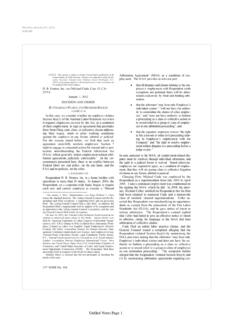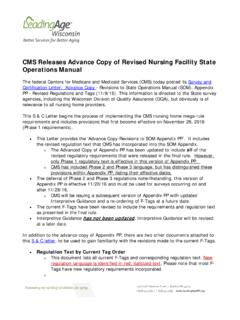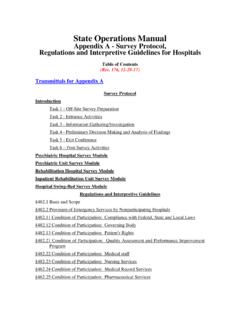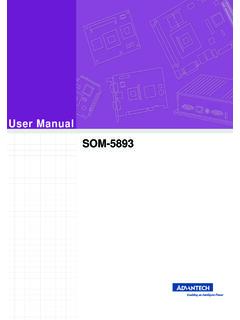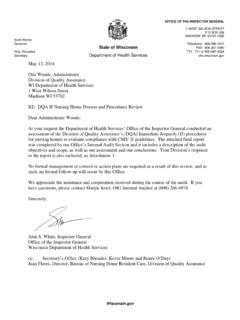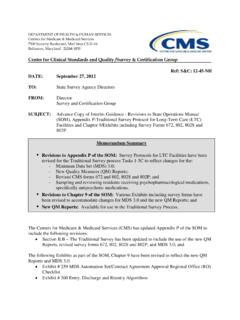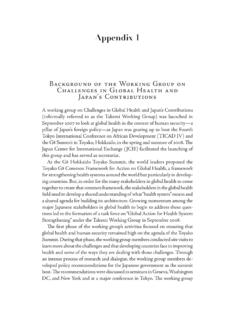Transcription of Transmittal (Advance Copy) Date - Amazon Web …
1 Attachment 2 CMS Manual System Department of Health & Human Services (DHHS) Pub. 100-07 State Operations Provider Certification Centers for Medicare & Medicaid Services (CMS) Transmittal (Advance Copy) Date: SUBJECT: Revised appendix A, Interpretive Guidelines for Hospitals, and appendix W, Interpretive Guidelines for Critical Access Hospitals (CAHs) I. SUMMARY OF CHANGES: Clarification is provided for existing hospital regulations 42 CFR (a) and (b), and new 42 CFR (h), concerning hospital patients rights, including advance directives and visitation rights. Clarification is provided for existing CAH regulations at 42 CFR (a), concerning compliance with Federal laws and regulations, including regulations governing advance directives and required patient disclosures. Guidance is provided for new 42 CFR (f), concerning CAH patients visitations rights. NEW/REVISED MATERIAL - EFFECTIVE DATE: Upon Issuance IMPLEMENTATION DATE: Upon Issuance The revision date and Transmittal number apply to the red italicized material only.
2 Any other material was previously published and remains unchanged. However, if this revision contains a table of contents, you will receive the new/revised information only, and not the entire table of contents. II. CHANGES IN MANUAL INSTRUCTIONS: (N/A if manual not updated.) (R = REVISED, N = NEW, D = DELETED) (Only One Per Row.) R/N/D CHAPTER/SECTION/SUBSECTION/TITLE R appendix A/ (a) Standard: Notice of Rights R appendix A/ (b) Standard: Exercise of Rights N appendix A/ (h) Standard: Patient Visitation Rights R appendix W/ (a) Standard: Compliance With Federal Laws and Regulations N appendix W/ (f) Standard: Patient Visitation Rights III. FUNDING: No additional funding will be provided by CMS; contractor activities are to be carried out within their FY 2011 operating budgets. IV. ATTACHMENTS: Business Requirements X Manual Instruction Confidential Requirements One-Time Notification Recur r ing Update Notification Revisions to appendix A Hospital Interpretive Guidelines A-0117 (Rev.)
3 (a)(1) A hospital must inform each patient, or when appropriate, the patient s representative (as allowed under State law), of the patient s rights, in advance of furnishing or discontinuing patient care whenever possible. Interpretive Guidelines (a)(1) The hospital must inform each patient, or when appropriate, the patient s representative as allowed by State law, of the patient s rights. Whenever possible, this notice must be provided before providing or stopping care. All patients, inpatient or outpatient, must be informed of their rights as hospital patients. The patient s rights include all of those discussed in this condition, as well as any other rights for which notice is required under State or Federal law or regulations for hospital patients. (See 42 CFR ) The patient s rights should be provided and explained in a language or manner that the patient (or the patient s representative) can understand.
4 This is consistent with the guidance related to Title VI of the Civil Rights Act of 1964 issued by the Department of Health and Human Services - Guidance to Federal Financial Assistance Recipients Regarding Title VI Prohibition Against National Origin Discrimination Affecting Limited English Proficient Persons (August 8, 2003, 68 FR 47311). In accordance with , hospitals are expected to comply with Title VI and may use this guidance to assist it in ensuring patient s rights information is provided in a language and manner that the patient understands. Surveyors do not assess compliance with these requirements on limited English proficiency, but may refer concerns about possible noncompliance to the Office for Civil Rights in the applicable Department of Health and Human Services Regional Office. Hospitals are expected to take reasonable steps to determine the patient s wishes concerning designation of a representative.
5 Unless prohibited by applicable State law: When a patient who is not incapacitated has designated, either orally to hospital staff or in writing, another individual to be his/her representative, the hospital must provide the designated individual with the required notice of patients rights in addition to the patient. The explicit designation of a representative takes precedence over any non-designated relationship and continues throughout the patient s inpatient stay or outpatient visit, unless expressly withdrawn, either orally or in writing, by the patient. In the case of a patient who is incapacitated, when an individual presents the hospital with an advance directive, medical power of attorney or similar document executed by the patient and designating an individual to make medical decisions for the patient when incapacitated, then the hospital must, when presented with the document, provide the required notice of its policies to the designated representative.
6 The explicit designation of a representative takes precedence over any non-designated relationship and continues throughout the patient s inpatient stay or outpatient visit, unless the patient ceases to be incapacitated and expressly withdraws the designation, either orally or in writing. When a patient is incapacitated or otherwise unable to communicate his or her wishes, there is no written advance directive on file or presented, and an individual asserts that he or she is the patient s spouse, domestic partner (whether or not formally established and including a same-sex domestic partner), parent (including someone who has stood in loco parentis for the patient who is a minor child), or other family member and thus is the patient s representative, the hospital is expected to accept this assertion, without demanding supporting documentation, and provide the required notice to the individual, unless: More than one individual claims to be the patient s representative.
7 In such cases, it would be appropriate for the hospital to ask each individual for documentation supporting his/her claim to be the patient s representative. The hospital should make its determination of who is the patient s representative based upon the hospital s determination of who the patient would most want to make decisions on his/her behalf. Examples of documentation a hospital might consider could include, but are not limited to, the following: proof of a legally recognized marriage, domestic partnership, or civil union; proof of a joint household; proof of shared or co-mingled finances; and any other documentation the hospital considers evidence of a special relationship that indicates familiarity with the patient s preferences concerning medical treatment; Treating the individual as the patient s representative without requesting supporting documentation would result in the hospital violating State law.
8 State laws, including State regulations, may specify a procedure for determining who may be considered to be the incapacitated patient s representative, and may specify when documentation is or is not required; or The hospital has reasonable cause to believe that the individual is falsely claiming to be the patient s spouse, domestic partner, parent or other family member. Hospitals are expected to adopt policies and procedures that facilitate expeditious and non-discriminatory resolution of disputes about whether an individual is the patient s representative, given the critical role of the representative in exercising the patient s rights. A refusal by the hospital of an individual s request to be treated as the patient s representative, based on one of the above-specified familial relationships, must be documented in the patient s medical record, along with the specific basis for the refusal.
9 In addition, according to the regulation at 42 CFR (a), (which cross references the regulation at 42 CFR ), each Medicare beneficiary who is an inpatient (or his/her representative) must be provided the standardized notice, An Important Message from Medicare (IM), within 2 days of admission. Medicare beneficiaries who have not been admitted ( , patients in observation status or receiving other care on an outpatient basis) are not required to receive the IM. The IM is a standardized, OMB-approved form and cannot be altered from its original format. The IM is to be signed and dated by the patient to acknowledge receipt. See Exhibit 16 for a copy of the IM. Furthermore, 42 CFR (c) requires that hospitals present a copy of the signed IM in advance of the patient s discharge, but not more than two calendar days before the patient s discharge. In the case of short inpatient stays, however, where initial delivery of the IM is within 2 calendar days of the discharge, the second delivery of the IM is not required.
10 The hospital must establish and implement policies and procedures that effectively ensure that patients and/or their representatives have the information necessary to exercise their rights. Survey Procedures (a)(1) Determine the hospital s policy for notifying all patients of their rights, both inpatient and outpatient; Determine that the hospital s policy provides for determining when a patient has a representative and who that representative is, consistent with this guidance and State law. Determine that the information provided to the patients by the hospital complies with Federal and State law; Review records and interview staff to examine how the hospital communicates information about their rights to diverse patients, including individuals who need assistive devices or translation services. Does the hospital have alternative means, such as written materials, signs, or interpreters (when necessary), to communicate patients rights?
